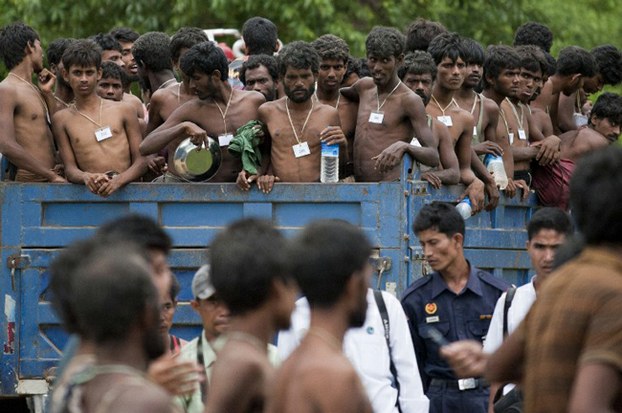Myanmar politicians urge humanitarian approach to boat people but reject criticism
| Publisher | Radio Free Asia |
| Publication Date | 4 June 2015 |
| Cite as | Radio Free Asia, Myanmar politicians urge humanitarian approach to boat people but reject criticism, 4 June 2015, available at: https://www.refworld.org/docid/5589504d31.html [accessed 21 May 2023] |
| Disclaimer | This is not a UNHCR publication. UNHCR is not responsible for, nor does it necessarily endorse, its content. Any views expressed are solely those of the author or publisher and do not necessarily reflect those of UNHCR, the United Nations or its Member States. |
2015-06-04
 Migrants found at sea on boats arrive at a temporary refugee camp near the Bangladesh border in western Myanmar's Rakhine state, June 4, 2015. AFP
Migrants found at sea on boats arrive at a temporary refugee camp near the Bangladesh border in western Myanmar's Rakhine state, June 4, 2015. AFP
Myanmar lawmakers and civil society members called on the government on Thursday to resolve humanitarian aspects of the boat people crisis, although they rejected criticism from other countries and NGOs over discrimination against ethnic minority Muslim Rohingya.
"We need to take care of the boat people as humanitarian issue," lawmaker Khin Maung Swe of the opposition National League for Democracy (NLD) told RFA's Myanmar Service.
"[But] I don't accept [assertions that we] discriminate against the Rohingya," he said. "We don't have Rohingya in Myanmar, so it's not fair that we are accused of discriminating against them if we don't have any in our country."
Myanmar's government views the Rohingya, who number roughly 1.1 million people in the country, as illegal immigrants from Bangladesh and refers to them as "Bengalis," although many have lived there for generations. The country's western Rakhine state is the traditional home of the Rohingya, many of whom have fled persecution they say they have suffered in the Buddhist-dominated country.
"We will solve Myanmar citizens' problems as an internal affair, but Bangladeshi citizens' problems should be resolve by other countries," said activist Ko Ko Gyi from the 88 Generation pro-democracy group.
Myanmar's parliament speaker Shwe Mann sent an open letter to United Nations Secretary-General Ban Ki-Moon on Wednesday asking that international organizations stop creating misconceptions about Myanmar, lawmaker Khin Saw Wai of the opposition National League for Democracy told RFA.
"In addressing the issues of human trafficking and boat people, we would request that national and international organizations exercise great care to avoid creating misconceptions about our country and aggravating communal tensions and conflict," said the letter, according to a translation published in the state-run Global New Light of Myanmar newspaper.
The letter came after the United States called on the country to grant full rights to Rohingya to prevent them from fleeing the country, and a U.N. Security Council briefing on human rights in Myanmar last week.
Myanmar has repeatedly denied that persecution has caused the Rohingya exodus.
Identity verification
In the meantime, Foreign Minister Wunna Maung Lwin said a group led by Myanmar's deputy minister of immigration and Bangladeshi officials from the country's embassy have began verifying the identities of the more than 700 boat people who arrived on Kanyinchaung village, Maungtaw township, in Rakhine state.
About 300 of the 734 boat people, previously reported to be 727, were transferred on Wednesday to temporary shelters in Taungpyo Letwae township near the border with Bangladesh, where more than 200 others have been housed. The roughly 400 others, who are from Bangladesh and Myanmar, remain in Kanyinchaung village.
During a press conference at the ministry in Yangon, Wunna Maung Lwin also said the Bangladeshi government had agreed to take back 150 of the more than 200 boat people arrested on May 21 because they are citizens of Bangladesh.
Maung Maung Ohn, chief minister of Rakhine state, said more than 100 "Bengalis" who live in Myanmar are among the 734 migrants, and the rest are from Bangladesh.
"Some of them said they left their country to work in foreign countries, and some said they were victims of human trafficking," he told RFA.
"We can't accept human trafficking," he said. "We are carefully investigating entries into and exits from Rakhine state with the Myanmar police, border police and the military. But concerning those who wanted to go aboard, it is totally incorrect that they left because we had discriminated against them."
Reported by Zin Mar Win, Win Ko Ko Lat, Thinn Thiri, Khin Maung Soe and Khin Khin Ei for RFA's Myanmar Service. Translated by Khet Mar. Written in English by Roseanne Gerin.
Link to original story on RFA website
